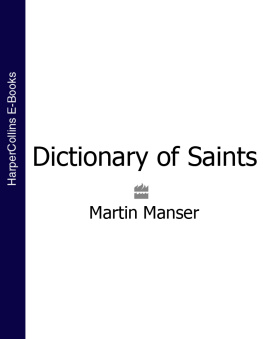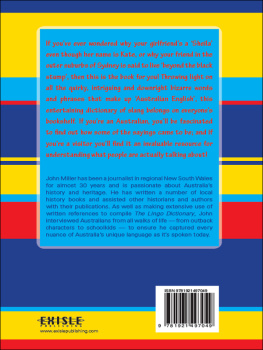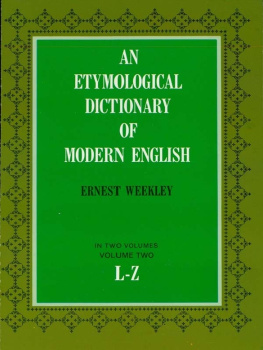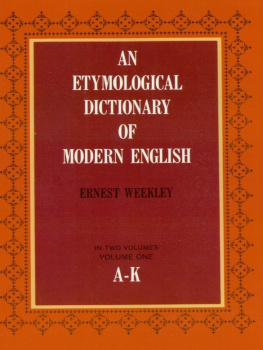SECOND EDITION
SECOND EDITION
MARTIN H. MANSER
Associate Editors: David H. Pickering Alice Grandison



The text of this second dictionary has been expanded to take into account the ongoing process of globalization. Over 500 entries have been added, including expressions that have become more frequently used in contemporary English, such as retro and sudoku; more prefixes and suffixes, especially those that are currently very productive, such as eco- and fest; terms relating to food, such as conchiglie, panini, and stollen; and terms relating to religions, such as Eid, Parousia, and Veda.
The opportunity has been also taken to delete certain entries that have become firmly and fully assimilated into English and to amend the very occasional error in the original edition.
Acknowledgments
I wish to record my thanks to my daughter Hannah for her help in compiling the index, and to David Pickering and Alice Grandison for their excellent editorial work on the first and second editions respectively.
Martin H. Manser
The American poet and essayist Ralph Waldo Emerson described the English language as "the sea which receives tributaries from every region under heaven." This dictionary has been compiled as an accessible guide to expressions that are derived from foreign languages. Some such words and phrases have been fully assimilated into the language (igloo, bonanza); others are still thought of as foreign (de rigueur, magnum opus).
Words and phrases that have become part of the English language cover a wide range of fields: entertainment (anime, flamenco, soiree), food and drink (blini, frlo, goulash, latte, stollen), language and literature (litotes, portmanteau, Sturm and Drang), law (force majeure, tort, virgo intacta), music (allegro, nocturne, tabla), politics and economics (arbitrage, glasnost, laissez faire, ombudsman), and religion and philosophy (chi, Corpus Christi, Diwali, Koran, Rosh Hashanah).
Headwords
Entries are arranged in strict alphabetical order. Letter-by-letter alphabetical order is followed:
fusilli
futon
fu yung
Hyphens are ignored:
faux amis
faux-naif
faux pas
Accents are included in the headword if that is how the word is usually rendered in English:
cafe
coup d'etat
piu
Words with the same spelling but with different etymologies are shown as separate entries:
forte' (fortay, forti) FRENCH [fort strong] noun a person's speciality or strong point
forte' (fortay, for i) ITALIAN [derived from Latin fortis strong] adjective in music...
Variant spellings of the headword are shown:
coup d'etat (koo dayta, koo data), coup d'etat FRENCH.
coupe (koopay), coupe FRENCH...
Pronunciation
A pronunciation of the word or phrase in American English is shown for each entry, except for cross-references.
A respelling system is used to show pronunciations:



Stress is shown by an underscore in the pronunciation:
fligelhorn (floogalhorn) GERMAN...
fons et origo (fonz et Orlgo) LATIN...
Where a word or phrase has more than one pronunciation, these are given, separated by a comma:
fondant (fondon(g), fondant) FRENCH...
In Latin words, pronunciation of the letter "v" has been shown as "v":
vexillum (vcksilam) LATIN...
It should be noted, however, that some Latin scholars prefer the alternative pronunciation "w," as in (weksilam). The existence of this alternative should be understood.
Etymology
The language of origin is shown in SMALL CAPITALS after the pronunciation:
jodhpurs (jodp5rS) HINDI [after jodhpur, India] plural noun a style of riding breeches...
Kaaba (kaba) ARABIC [cubic building] noun the square stone shrine...
The meaning of the word or phrase in the original language is given after the language of origin:
menage a trois (maynahzh a twa, menahzh a twa) FRENCH [household of three] noun phrase a domestic arrangement in which three people live together in the same household (usually understood to imply a sexual relationship...
kiosk (keeosk) FRENCH [kiosque, derived from Turkish kiushk pavilion, ultimately from Persian kushk portico] noun a small stall, booth, pavilion...
Significant changes in spelling between the original language and English are shown in the etymology:
feme covert (feem kovart) FRENCH [covered woman, from femme woman and couverte covered] noun phrase...
feme sole (feem s61) FRENCH [single woman, from femme woman and seule alone] noun phrase...
Eponymous words include the name (with birth and death dates) that they are derived from:
jacquard (zhakard) FRENCH [after Joseph-Marie Jacquard (1752-1834), inventor of the jacquard loom] noun a piece of fabric woven on a jacquard loom, or the loom on which such material is made...
Toponymous words include the place-name that they are derived from:
faience (fayons) FRENCH [after Faenza, Italy] noun colorful tin-glazed earthenware...
marathon (marathan, marathon) GREEK [after Marathon, Greece, where the Greeks defeated the Persians in 490 B.C., the news of the victory being rushed to Athens by a long-distance runner] noun a long-distance race run over a course of 26 miles 385 yards...
Additional background information may be included in the etymology:
veni, vidi, vici (vaynee, veedee, veechee) LATIN [I came, I saw, I conquered, as quoted by Julius Caesar (100-44 B.C.) on his victory over Pharnaces, king of Pontus, at Zela in 47 B.C.] interjection...
Grammatical information
The part of speech is shown for all entries, indicating the grammatical behavior of the English word or phrase:
obi (obee) JAPANESE [belt] noun a sash worn round the waist as part of traditional Japanese dress...




















